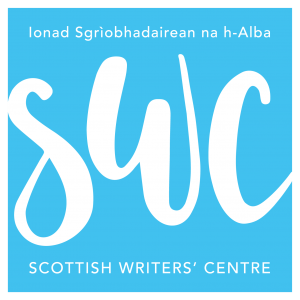 In October, the Scottish Writers’ Centre brought writer Louise Welsh to run an event as part of our series, “In Process Masterclass”. The discussion of her published novels explored not only her writing, but also her process and the inspirations behind the trilogy she is currently working on. Welsh has been working on the trilogy, entitled Plague Times, for the last three or four years, and the first two parts, A Lovely Way to Burn and Death is a Welcome Guest, are already available for purchase.
In October, the Scottish Writers’ Centre brought writer Louise Welsh to run an event as part of our series, “In Process Masterclass”. The discussion of her published novels explored not only her writing, but also her process and the inspirations behind the trilogy she is currently working on. Welsh has been working on the trilogy, entitled Plague Times, for the last three or four years, and the first two parts, A Lovely Way to Burn and Death is a Welcome Guest, are already available for purchase.
Plague Times looks at a modern day United Kingdom as it is stroke by a plague, decimating a large percentage of the population. Welsh found inspiration in many places, from the 1984 BBC drama Threads by Barry Hines, to the Glasgow slave trade of the 18th century. However, one of her biggest inspirations stuck with me while she was talking, a quote from Aristotle.
“For that some should rule and others be ruled is a thing not only necessary, but expedient; from the hour of their birth, some are marked out for subjection, others for rule.”
Aristotle, Politics.
Plague Times not only looks at how a modern civilisation survives when faced with a cataclysmic event, but how civilisation continues in the years after. When disaster strikes, the rich get richer, profiting from the terror. This idea is a terrifying one by itself, forcing the reader to consider the state of the world we live in, which is something Welsh engages with in detail not only in the two published volumes of the trilogy, but she hinted that it will take centre stage in the final part of her epic.
It was fascinating to hear how so many small elements gave Welsh the idea for Plague Times, and how the strands joined together to inspire her. She talked about the influences from her childhood, and the fears you had growing up can be traced back to certain places in your life. For Welsh these were fears of nuclear bombings, with threats of death always looming in the background as the Cold War influenced so much of life in the 1980s. It is no wonder then, that this fear of decimation would return in her later works. Welsh was also inspired by her own works, and she spoke specifically about her novel Tamburlaine Must Die. While the influence may not be obvious, Welsh spoke about how the connections between the historical time she was writing about in Tamburlaine and the modern day, specifically the distrusting of the “other”, had stayed with her in the decade between the book and the first part of Plague Times.
Towards the end of the event Welsh told the audience that “sometimes you plant seeds that you come back to later”. This was something that has stuck with me since then, and I feel it’s important for all writers to remember. Anything can inspire your writing, from historical fact to childhood fears. As Louise Welsh has shown, remembering these ideas and engaging with them over time can lead to some of your best work.
More information about Louise Welsh can be found here.
Welsh also runs Creative Conversations, a weekly event with writers at the University of Glasgow. Information regarding these events can be found here. You can also find the SWC’s blog post on the series at Bookmarked: Creative Conversations.
Words by Andrew Smith.



